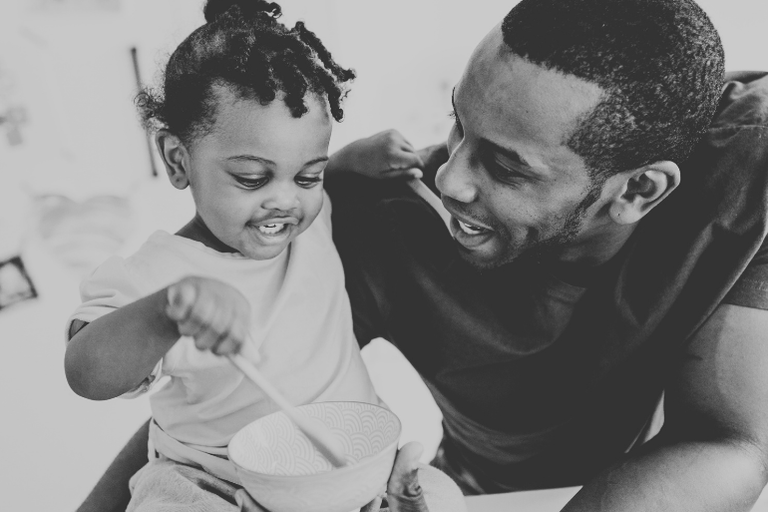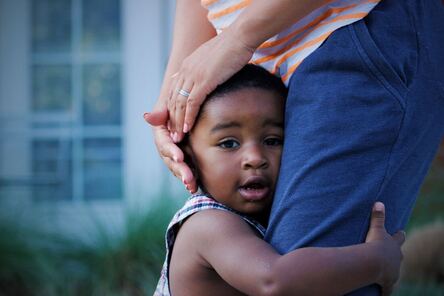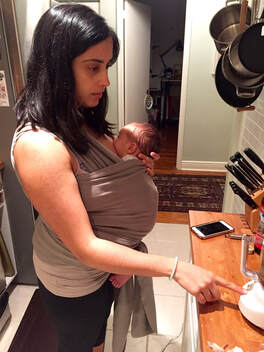|
In my last newsletter, I shared a post written by a fellow progressive educator who goes by Teacher Tom. In his post Isn't it also belittling to children? he shares some thoughts on how well-meaning adults can inadvertently limit children's exploration, and by extension their learning, by offering their own explanations or definitions as a way of teaching or engaging in children's play. I have witnessed many similar situations to those that Teacher Tom describes. Innocent questions such as "What are you drawing?" that result in a child's experience being abruptly and automatically limited by an adult's comment. As an early childhood teacher, a large part of my own practice is dedicated to understanding how to extend children's learning through our interactions. And it does take practice! To be clear, it's not that asking a reductive question ("What color is this?") or making a comment that is prescriptive ("This is how you connect the legos.") is catastrophic or even deeply problematic. We experience enough pressure as parents to also be asked to second-guess every word that comes out of our mouths. Being in relationship and playing with your child is much more important than being able to ask the "best" or "right" question--as if there is one. But it you find yourself curious to explore different ways of participating in your child's play and learning, here are some things you could consider exploring. 1- Observe - Often just being with your child, watching what they are doing, how they are doing it, and staying close by is enough. The feeling of being seen and appreciated is valued by all people, including children. It alone can support learning and exploration. This pausing to watch also allows time for us to check in with ourselves before speaking. Am I present? Am I curious? Am I breathing?
2- Connect - A close friend and fellow teacher would say he tried to be like the air in the classroom. Always there but an invisible support until needed or invited in. Sometimes the invitation is your child looking up at you. Sometimes it might be a question, a shared laugh, or a "Come play with me!" And sometimes it may be that it's you that wants to connect and let them know that you see what they are doing and are interested. Try starting with simply noticing together. "I notice how carefully you're lining up the blocks." "I remember you lined them up just like this yesterday." 3- Reflect together - In observing you might become curious to know more about what your child is exploring. Maybe you wonder what experiences are informing their ideas. Extending children's learning is not about telling them what you know, but rather guiding them to reflect and share their own ideas and finding opportunities to expand their thinking. Wondering together is a great way to do this. "I wonder if you've seen something like this before..." "Ah, yes! You are lining them up like train cars!" "I wonder where this train might be going." These 3 steps can serve as a guide for playing with babies, toddlers and beyond! If you try them and find them helpful I'd love to hear. As a new parent, even with all of my experience and knowledge about babies, I still found myself looking to my daughter's pediatrician for support. Like many parents, the first few months with my baby were a time when days and nights ran into each other, and the little nucleus that was myself, my husband and my baby filled every moment. It was difficult to step back, take a breath, and find some greater perspective on the experience because it was all encompassing. So we found ourselves looking to the experts around us. Other parents, my doula, my midwives, colleagues, and our pediatrician.
It was a support network that we had to create. We were able to do so because we had the resources and education to do it. And because of my professional experience, when I was confronted with advice and screenings that were misinformed, misguided, or that simply didn't fit our family I was able to discard the information in favor of my intuition and knowledge. I did not always feel comfortable advocating for my family, but I always felt confident about my decisions. Not all families have this privilege. Pediatricians are uniquely positioned to offer families support because they are often the primary point of contact for new parents. Babies are in the office every couple of weeks or months in the first year. Progress can be tracked. Parents and babies can be observed. And when an office is equipped to offer the kinds of support that new families need (including lactation experts, postpartum mental health specialists, developmentally sound advice rather than opinions, community, and inclusivity), babies and families thrive. Care can be holistic, compassionate, and transformative. This is why I am encouraged by Premier Pediatric's new pilot program, The First Month Project. It is a collaboration between this pediatric practice and a robust group of local professionals including psychologists, midwives, doulas, lactation consultants, early childhood specialists, social workers and more. By bringing together a network of resources in the community, The First Month project aims to "ease the transition and address the needs of your young family." Premier Pediatrics is committed to supporting babies and children by supporting their families. Offering the First Month Project is a way to help start parents on their journey from a place that is grounded in community and care. I am happy to be joining the First Month Project at Premier Pediatric's Brooklyn office, where I will collaborate with Dr. Jon Sarnoff to offer classes about infant development. Upcoming: Raising a Healthy Sleeper Raising a Happy Eater Development: What's around the corner? You can read more about the project at www.thefirstmonth.org and about Premier Pediatrics at www.premierpedsny.com With the first snow of the season, colorful lights have started to appear in windows and lobbies here in Brooklyn. The holiday season is upon us. Many families will soon be celebrating a holiday (or two or three), and everyone will notice the sights and sounds of this time of year, especially our children. December comes with excitement and anticipation. It also brings lots of stimulation, social gatherings, family, travel for some, and changes in routine. And feelings. Lots of feelings. This is a month where finding balance becomes important for everyone. Which routines are okay to let go of? Which ones are helpful to keep in place? When it comes to young children, they are our best guides. Some babies and toddlers adapt easily to changes, and others will need more support. That support might look like setting boundaries around nap times, or it might mean that naps look different while you're away from home. Sometimes, in the excitement and bustle of this time of year, we can lose sight of what things might feel like from our child's perspective. Holidays like Christmas and Hanukkah are often presented with much fanfare and enthusiasm. Whether it is the expectant gaze of a grandparent who is eager to share a tradition, or the Christmas carols playing in every store, children notice the intensity. Without many previous experiences to ground their understanding, this can sometimes result in discomfort or a child that is easily overwhelmed. Slowing down can help. So can adjusting our expectations, adapting our traditions, and preparing babies and toddlers for what their holiday will look like. A joyful and peaceful holiday with babies and toddlers is possible, and an amazing opportunity for bonding and growth. Learning to adapt and be flexible will benefit our children (and our families) when we set ourselves up for success. If you are local, and have specific questions consider joining my yearly Joyful Baby & Toddler Holidays class at The Wild on December 14th. Topics will include:
Sleep regression. Potty training regression. Separation regression. The implication is always of a step backward. A loss of sorts. Of course, what we mean as parents is that our baby or toddler is behaving in a way we thought they had outgrown. Maybe they're waking more often or clinging to us at drop-off when they used to walk in to daycare without a second glance. Regressions are such a normal part of development, that some are even presented as inevitable. "The dreaded four month sleep regression" comes to mind. They become something to check off a list of milestones. Something to get through. To tackle. A different way to think about regressions is that they are periods of time when our baby or toddler (or child, or spouse, or friend) needs more support to do some of the things that they are capable of doing. It may be that they have acquired a major new skill that their body and brain need to practice over and over to master--like learning to roll. Or that a new perspective on their independence, such as when they learn to crawl, has suddenly made them more aware that they don't control your comings and goings. Maybe they moved up a room in daycare and the change in environment means they need extra cuddles and time to feel safe. Whatever the reason, these are moments when our child is seeking support and reassurance. Sometimes it may be emotional, such as reminding a recently potty trained child that they will always be your baby and you will always care for them. Sometimes it may be more physical, such as helping your newly rolling baby get back to sleep comfortably. At times it may require lovingly holding boundaries to help a toddler feel safe. Rest easy that your child is not somehow backsliding. They are growing and changing, and needing help from their loved ones is a part of that. There is a predictable cycle to development. One part of the cycle is outward facing. These are times when our child is feeling capable, confident, and curious to venture into the world and try new things. The other part of the cycle faces in, towards home. These are times when our child needs reassurance, welcoming arms, and some willing help. Children are always at some point of this cycle, and it can change from moment to moment. Our job as caregivers is to notice and respond as well as we can. We won't be able to always meet the needs but it matters that we're prepared to try. When children can draw nourishment from our empathy, they are able gather themselves and reemerge with confidence. What would happen if instead of framing the inward facing moments as regressions, we thought of them simply as a time when our child needs us close by. A time of gathering? The first few months home with my daughter were a time of tremendous growth for my husband and I. There were many things that we suddenly found very difficult to do. Making dinner felt nearly impossible some days. So we reached out for help. What did that help look like? Having a parent or friend make us dinner. Ordering take-out. Hearing, "This is a hard time right now, I can help." not "You can do it! You know how to make easy dinners. I believe in you." Just because you offer your child more support today, does not mean that they will become dependent on it for the long run. If they have been given sensitive support, your child will shortly go back to doing things for themselves, just as my husband and I now cook dinner most nights. (And when we need to, we still order take-out.) A very important caveat, a true developmental regression such as a loss of skills, vocabulary, or movement abilities should be discussed with your child's pediatrician as it could be a cause for concern. Similarly, if you sense that your child's development has stalled, it is always best to bring up your observations with your child's doctors, teachers or team of specialists. Trust yourself if you have any doubts. Sleep is a topic that looms large over the first (and second, and third) year of parenting. From the moment my child was born, I was getting advice from every direction. Even when it wasn't advice the question of "How does she sleep?" was ever present. It was hard to resist being consumed it, since every nap and night presented the opportunity to answer differently. My baby slept... like a baby. At first a lot, then less and less. Sometimes on her own, often on me, or my husband, or a very willing grandparent. Patterns would emerge, then fall away. The things we knew to be true about her, would become so far from the truth as to be unthinkable just a week or two later. She nursed to sleep until she no longer did. Not because of me, but because something within her shifted. In short, her sleep evolved. At times with some gentle nudging from us. As for us, we slowly, sometimes painfully learned to be flexible. Helping a baby sleep takes patience. It takes being aware of your baby and their needs, as well as your own. What your newborn needs is different from what your six month old needs. And what one child needs will be different from another. You and your baby may both need more time together at night after returning to work, and you might also really need some rest. Like all of our relationships, it is a balance. And it is okay to change our approach when it is no longer working. Baby Sleep in the First Year is ever unfolding. And so this workshop is about freeing you from the weight of total responsibility for your baby's sleep, while offering the tools to support both your baby and your family in getting the sleep you need however that looks.
We will look at the science of infant sleep, as well as the cultural influences. We will talk about temperament, early experiences, biology and how they function in terms of sleep. We will talk about what your family needs. Maybe that is time with the baby in the evening after work, or time with your partner or for yourself. Maybe it is a baby that can nap on the go, or maybe you need the consistency of a nap at home. We will talk about sleep training and how to support your baby to sleep on their own while cultivating a secure attachment. We will take a look at a variety of sleeping arrangements. And I will leave you with a framework and plan to ensure that baby gets the sleep and the nurturing relationships they need to thrive. All without judgment. Upcoming classes: Baby Sleep in the First Year October 5th & December 7th at Parent Craft And if you can't make it in person, I offer these classes in your home (in parts of NYC/Brooklyn) or over the phone (anywhere). This September, I’ll start teaching a new series of classes and workshops focused on infants. I’m deeply grateful to be partnering with Parent Craft, a wonderful hub offering support for new parents from preconception through birth and beyond.
We will also offer two alternating workshops on the first Saturday of the month. Like all of the classes at Parent Craft, the experience will be highly personalized and intimate. All About Baby classes are informed by developmental theory and research, personal and professional experience, and a desire to understand each family and baby.
Our goal is to help you thrive as a parent and enjoy the journey. Learn more at www.parentcraft.org |














 RSS Feed
RSS Feed
